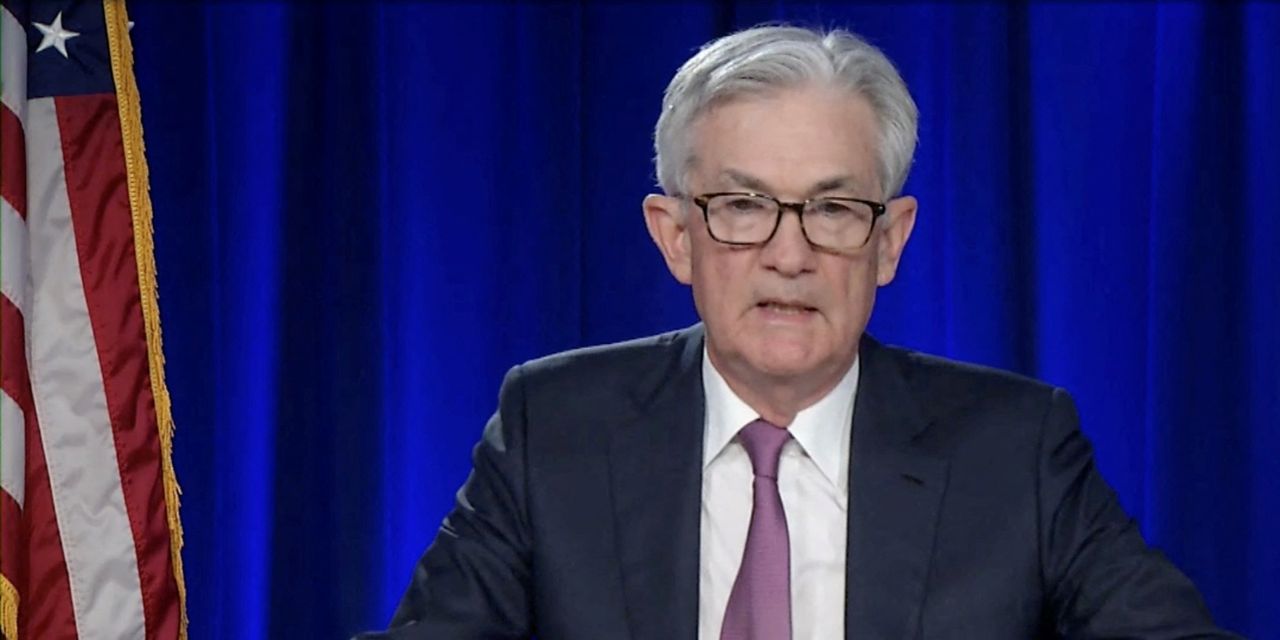
The past few weeks of stock market turmoil don’t mean the economy is about to be derailed, but rather that the recovery is maturing and no longer needs low interest rates, economists and Federal Reserve officials say.
While the economy’s rebound from the pandemic-induced recession in spring 2020 has been strong, the stock market’s has been spectacular. Between its trough in March 2020 and its all-time high Jan. 3, the S&P 500-stock index soared 114%. Now, despite the economy growing more in 2021 than at any time since 1984, the S&P 500 index is down about 8% from that peak.
On Wednesday, Federal Reserve Chairman Jerome Powell said the market drop wouldn’t harm the recovery. He said it is a natural response to the Fed’s planned phaseout of the emergency stimulus programs implemented at the start of the pandemic that helped prop up asset prices.
“We feel like the communications we have with market participants and with the general public are working and that financial conditions are reflecting in advance the decisions that we make,” Mr. Powell said.
Asset prices are linked to the economy in several ways. In part, they reflect investors’ expectations of future growth. Recessions are usually preceded by significant stock market declines. While economists surveyed by The Wall Street Journal this month put the probability of recession in the next 12 months at just 18%, they do see growth slowing sharply this quarter. (To be sure, economists have a poor record in predicting recessions.) The spread between short and long-term bond yields, called the yield curve, has also shrunk, which usually signals slowing growth.
Asset prices also directly affect the economy through the “wealth effect.”
A rising stock market pads retirement portfolios and other forms of wealth which can make consumers more willing to spend. Likewise, when the stock market is down, people feel poorer and may splurge less.
A study last year by economists at Harvard University, the Norwegian Business School and the Massachusetts Institute of Technology quantified the wealth effect, estimating that households spend 3.2 cents of every additional dollar they get from rising stock prices.
In the third quarter of last year, the value of financial assets held by American households was almost 32% higher, or $27.5 trillion, than in the first quarter of 2020, when the pandemic first took hold in the U.S., according to Federal Reserve data.
At the same time, consumer spending, unadjusted for inflation, rose 13.2% between the first quarter of 2020 and the fourth quarter of 2021, according to the Commerce Department.
Bank of America economists estimate that the wealth effect added between 1.3% and 2.5% to consumer spending growth in the second quarter of 2021 and between 1.2% and 2.4% in the third, more than at any point since at least 1954.
Fed officials take advantage of the wealth effect when trying to move the economy out of recession, according to a study by Ricardo Caballero and Alp Simsek, both of MIT. By lowering interest rates or buying bonds, which raise asset prices early in the recovery, the Fed prompts stockholders to spend more, boosting demand.
When Fed officials determine the economy no longer needs such support, they signal they will unwind their asset purchases and raise interest rates. Stock markets fall as a result.
That, Mr. Caballero said, describes the current situation. The Fed has signaled it will stop buying bonds and begin raising interest rates in March to tamp down inflation, which at 5.8% in December, using the Fed’s preferred price index, is far above its 2% target. It’s not a harbinger of recession, but a sign that the recovery is moving to a new phase, ideally one characterized by longer-term measured growth, he said.
“We are at a point in which [aggregate demand] is at the level current supply needs,” he said. “The speed of the recovery going forward will depend largely on how fast aggregate supply recovers.”
Joel Naroff, president of Naroff Economics, said wealth is still well above where it was before the pandemic, which should buffer consumers from the volatility of the past few weeks.
In the short term, however, Matthew Luzzetti, chief U.S. economist at Deutsche Bank Securities, said lower asset prices could, along with the end of federal child tax credit payments and the continued grip of Covid-19, erode consumer confidence. “The wealth effects create more uncertainty about the outlook and are hard to quantify,” he said.
SHARE YOUR THOUGHTS
What is your biggest concern over market volatility? Join the conversation below.
Lower stock prices may have a positive side: By cooling demand, they may also take some pressure off inflation. Mr. Luzzetti said lower asset prices could also make retirement less attractive for some older workers, which could ease a labor shortage when the unemployment rate is at a historically low 3.9%. A study by the St. Louis Fed concluded higher financial and real-estate asset values account for roughly 15% of the total decline in labor-force participation among those aged 51 to 65 between January 2020 and September 2021.
For now, the Fed doesn’t seem concerned about the market. Speaking to reporters Wednesday, Mr. Powell focused on the risk of persistently high inflation, which would require faster rises in interest rates.
That could lead to further stock market declines, said Dana Peterson, chief economist at the Conference Board. “It’s really going to be this tug of war over the year in terms of how much markets react to Fed actions and how much the Fed ignores it,” she said.
Write to David Harrison at [email protected]
Copyright ©2022 Dow Jones & Company, Inc. All Rights Reserved. 87990cbe856818d5eddac44c7b1cdeb8








